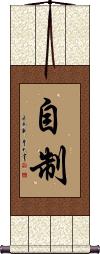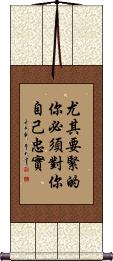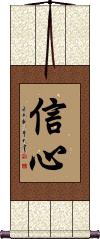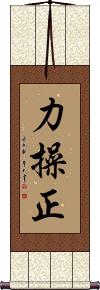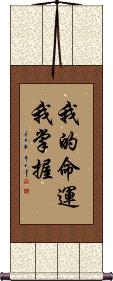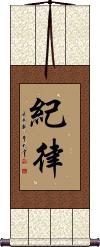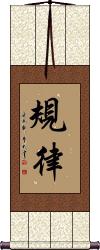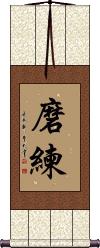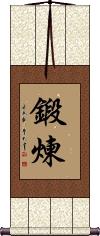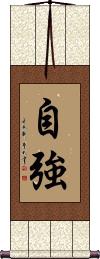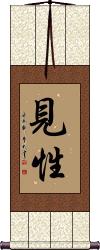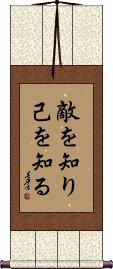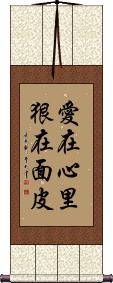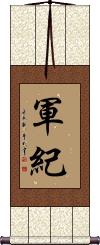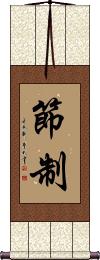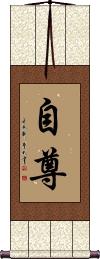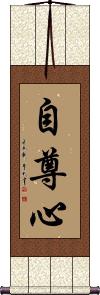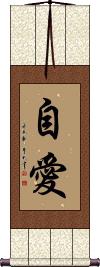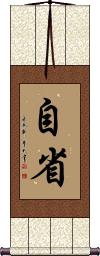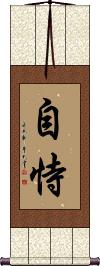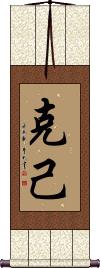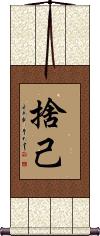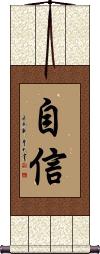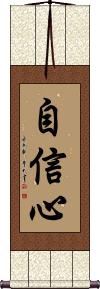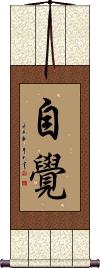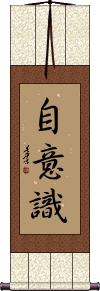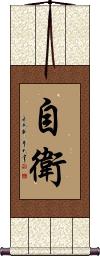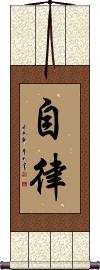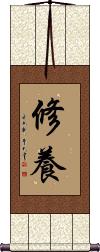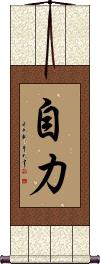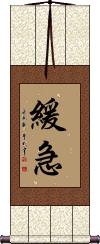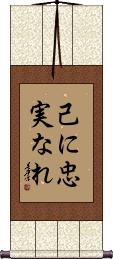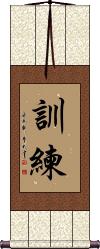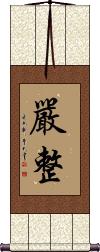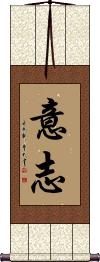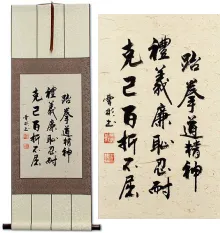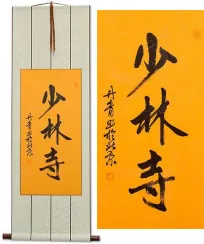Buy a Self-Control Chinese & Japanese Calligraphy Wall Scroll
Choose from many options to create artwork with Self-Control characters on a wall scroll or portrait.
If you want to create a cool Self-control wall scroll, this is the place. Below you will find a few Asian symbols that express the idea of self-control.
1. Self-Control
2. ...And this above all to thine own self be true
3. Confidence / Faithful Heart
6. Discipline
7. Discipline / Training / Tempering Character
8. Discipline
9. Exercise
10. Inner Strength / Self-Improvement
11. Jiko no Kansei / Self-Completion
12. Kensho - Initial Enlightenment
13. Know Thy Enemy, Know Thyself
14. Love Your Children, But Discipline Them Too
17. Pride
18. Prideful Mind / Self-Respecting Heart
19. Self-Love / Love Yourself / Love Oneself
20. Introspection / Self-Awareness
21. Changing Oneself / Self Reformation
22. Self-Reliance
23. Self-Restraint / Self-Control
24. Self Sacrifice
25. Self-Confidence
28. Self-Defense
29. Self-Discipline / Will-Power
30. Self-Improvement
31. Self-Respect / Self-Esteem
32. Power of Oneself / Self-Sufficient
34. Self Awareness Becomes a Buddha
35. Speed Control
36. Standing by Oneself / Walking by Oneself
37. Always Striving for Inner Strength
38. Strong Hearted / Strong Willed
39. Temperance
41. Training / Drill
42. Well-Disciplined / Orderly
43. Determination to Achieve / Will-Power
Self-Control
The short and sweet version of self-control.
Note: This can also mean self-restraint.
See Also: Will-Power | Discipline
Self-Control
自己抑制 has a meaning like “to restrain oneself” in Chinese, Japanese, and old Korean.
The first two characters mean “regarding oneself,” and the second two mean “to refrain” or “to restrain.”
See Also: Discipline | Will-Power
...And this above all to thine own self be true
A line from Shakespeare's Hamlet
Confidence / Faithful Heart
信心 is a Chinese, Japanese, and Korean word that means confidence, faith, or belief in somebody or something.
The first character means faith, and the second can mean heart or soul. Therefore, you could say this means “faithful heart” or “faithful soul.”
In Korean especially, this word has a religious connotation.
In the old Japanese Buddhist context, this was a word for citta-prasāda (clear or pure heart-mind).
In modern Japan (when read by non-Buddhists), this word is usually understood as “faith,” “belief,” or “devotion.”
See Also: Self-Confidence
Control of Power
Him Cho Chung
力操正 is a Korean martial arts title meaning “Power Control.”
It's most often cited as one of the 8 key concepts from Tang Soo Do.
This can be pronounced in Chinese but will only be recognized by those familiar with martial arts terms.
I Control My Own Destiny
我的命運我掌握 is a way to write “I control my own destiny” in Chinese.
The direct translation is more like, “My destiny, I'm in control.” The meaning is the same, but Chinese grammar and word order vary a bit from English.
There's a few other variations, and if you want any of these, just email me:
我的命运我做主 (wo3 de ming4 yun4 wo3 zuo4 zhu3) "my destiny, I'm in charge"
我的未来我掌握 (wo3 de wei4 lai2 wo3 zhang3 wo4) "my future, I'm in control"
我的未来我做主 (wo3 de wei4 lai2 wo3 zuo4 zhu3) "My future, I'm in charge"
Discipline
紀律 is a Chinese and Korean word that conveys the idea of extreme self-control and perhaps self-sacrifice, and obedience.
This word matches the kind of “discipline” I was in the Marine Corps. There is also an additional idea of maintaining order or being orderly in your tasks.
This idea would also fit an athlete training for the Olympics who gives up many pleasures to stay focused on their training.
See Also: Self-Control | Will-Power
Discipline
規律 is a Japanese word for discipline that relays the ideas of keeping order, and observance (of rules, laws, regulations).
This is also a word in Chinese and old Korean Hanja where it suggests that you are one who follows a certain law of behavior or has a regular and dependable pattern of behavior, personal regime, or rhythm.
See Also: Self-Control | Will-Power
Discipline / Training / Tempering Character
磨鍊 is a form of discipline which suggests training of the mind and character, aimed at producing self-control, obedience, etc.
One of my Chinese-English dictionaries even translates this as “tempering oneself” or turning yourself into hardened steel.
In old Korean Hanja, they use these characters in reverse order but with the same meaning. If you want the Korean version, please click this link instead of the button above: Korean version.
Discipline
鍛練 is the Japanese Kanji and Korean Hanja word used for discipline.
This has a meaning like “forging or creating something from lots of training and practice.” My Japanese dictionary translates this as “tempering, forging, hardening, disciplining, training.”
This is for Japanese and Korean only. In Chinese, these characters might be translated as (physical) “exercise.”


The modern form of the second Japanese Kanji looks like the first image to the right. There’s also an alternate modern form after that, and finally, an alternate traditional form. Because calligraphy is an art, the calligrapher could choose any of these possible forms. Let us know if you have a preference.
See Also: Self-Control | Will-Power
Exercise
(for body or mind)
鍛煉/鍛鍊 means to exercise in much the same way we use the word exercise in English.
This can be exercising your body at the gym or exercising your mind in studies. Most of the time, this refers to physical exercise.
This can also be translated as to temper, to toughen, to train, to drill, to forge, or simply discipline.
Inner Strength / Self-Improvement
自強 is the kind of inner strength that applies to a person who has will-power and can inspire themselves to do great things.
自強 can also be the creed of a person that always pursues self-improvement.
Other translations: self-strengthening, striving for improvement, self-improvement, striving to become stronger, and self-renewal.
Jiko no Kansei / Self-Completion
Kensho - Initial Enlightenment
見性 has the same meaning as Satori but refers to the initial state or initial experience of enlightenment.
This can also mean “self-discovery,” “self-awareness,” or “consciousness of one's character.”
In a very religious context, this means to behold the Buddha nature within oneself.
This term is exclusively used by devout Buddhists. It is not a common term, and is remains an unknown concept to most Japanese and Chinese people. Some Japanese people will dispute whether this title is valid in the Japanese language. Only order this if you are sure this title is right for you.
See Also: Buddhism | Enlightenment
Know Thy Enemy, Know Thyself
This proverb is from Sun Tzu's (Sunzi's) Art of War.
It means that if you know and understand the enemy, you also know yourself. Four secondary characters come after this in the Art of War (not included here) which suggests you cannot lose a battle when you follow this philosophy.
In a very literal and somewhat-boring way, this can also be translated as “Estimate correctly one's strength as well as that of one's opponent.”
Know Thy Enemy, Know Thyself
敵を知り己を知る is the Japanese version of “know your enemy, know yourself.”
There is a longer version of this proverb that adds, “...and you can win 100 battles.”
Note: Because this selection contains some special Japanese Hiragana characters, it should be written by a Japanese calligrapher.
Love Your Children, But Discipline Them Too
Military Discipline
軍紀 means military discipline or military principles.
If maintaining your military discipline is important to you personally or important to your military unit, this is the wall scroll to have up behind your desk. In fact, it's the kind of thing I expect to see behind the desk of a First Sergeant or maybe a hardcore NCO.
Note: In some rare contexts, it could be extended to mean “morale,” but “discipline” is much closer to the commonly-held definition.
Note: This term is not well-known outside the military services in Asia (not used by the common person).
See Also: Self-Discipline
Moderation / Temperance
節制 means moderation or temperance in Chinese, Japanese Kanji, and old Korean Hanja.
Moderation is creating a healthy balance in your life between work and play, rest and exercise. You don't overdo or get swept away by the things you like. You use your self-discipline to take charge of your life and your time.
節制 can also be translated as sobriety or self-restraint.
This is often used as part of the Seven Heavenly Virtues to represent sobriety and/or temperance.
Pride
自尊 can mean “pride,” “self-respect,” or “self-esteem.” The first character means “oneself,” and the second can mean revered, valuable, precious, noble, exalted, honorable, or simply “pride.”
I have also seen this two-character word translated as “amour propre,” self-regard, and self-pride.
自尊 is universal between Chinese, Japanese Kanji, and Korean Hanja written languages. It may also be understood in old Vietnamese (they once used Chinese characters as well).
Prideful Mind / Self-Respecting Heart
自尊心 is a Japanese and Korean word that means “pride” or “self-respect.”
The first Kanji/Hanja means oneself. The second can mean revered, valuable, precious, noble, or exalted. And the last Kanji/Hanja means heart, mind, and/or spirit.
While these characters make sense and hold the same general meaning in Chinese, this is not a normal Chinese word. This selection should only be used if your audience is Japanese or Korean.
See Also: Respect | Pride | Self-Reliance | Self-Control | Self-Discipline
Self-Love / Love Yourself / Love Oneself
自愛 means self-love, self-regard, regard for oneself, cherishing one's good name, taking care of oneself, or love myself.
In the Buddhist context, this is the cause of all pursuit or seeking, which in turn causes all suffering. All Buddhas discharge themselves from self-love and all pursuits of personal gratification. Such elimination of self-love is a step towards nirvāṇa.
This title can be taken as positive or negative, depending on how you read it. Some will see it as arrogant, and others will read it as a token of self-respect. Because of this ambiguity, I do not recommend this title for a wall scroll.
Introspection / Self-Awareness
自省 is the Chinese, Japanese Kanji, and old Korean Hanja means: to examine oneself; to reflect on one's shortcomings; introspection; self-awareness; self-criticism; self-examination; reflection.
In Japanese, this can be the given name, Jisei.
Changing Oneself / Self Reformation
Self-Reliance
自恃 means self-reliance but is often used to mean self-confidence or the state of being self-assured.
Basically, this means you can rely on yourself (with a slight suggestion that others can rely on you as well).
The first character means “oneself,” while the second means “to rely upon.”
See Also: Confidence | Self-Confidence
Self-Restraint / Self-Control
克己 can be translated as “self-denial,” “self-abnegation,” “self-restraint,” “self-discipline,” “self-mastery,” or selflessness.
As a tenet of Korean taekwondo, and other martial arts, this is often used with the title “self-control.”
Self Sacrifice
Self-Confidence
自信 is created by simply putting the character for “faith/believe/confidence” with the character for “oneself” in front of it.
The literal translation holds the same meaning in English, Chinese, and Japanese.
It's like a self-affirmation to say, “you can do it.”
Some may also use this to mean self-esteem or a sense of self-worth. 自信 is also how to say “believe in oneself.”
See Also: Confidence
Self-Confidence
自信心 is the long title for self-confidence.
It differs from the other version, only with the addition of the character for heart or soul at the end. With that addition, you could say this means a self-confident heart.
See Also: Confidence
Consciousness of Self
自覺 is the idea of being conscious, self-aware, and sometimes “on one's own initiative.”
![]() After WWII, they started using a simplified form of the second Kanji for this word in Japan. That version is shown to the right, and you can click on that Kanji if you want the modern Japanese form. Otherwise, the characters shown in the upper left are the correct ones for ancient/old/traditional Chinese, Japanese, and Korean.
After WWII, they started using a simplified form of the second Kanji for this word in Japan. That version is shown to the right, and you can click on that Kanji if you want the modern Japanese form. Otherwise, the characters shown in the upper left are the correct ones for ancient/old/traditional Chinese, Japanese, and Korean.
Self Consciousness
自意識 is the idea of being conscious and self-aware in Japanese Kanji and old Korean Hanja.
This is not a normal word in Chinese.
Self-Defense
Self-Discipline / Will-Power
自律 means self-discipline and self-control.
It is doing what you really want to do rather than being tossed around by your feelings like a leaf in the wind. You act instead of reacting. You get things done in an orderly and efficient way. With self-discipline, you take charge of yourself.
Not sure if this one works for a Japanese audience.
See Also: Discipline | Self-Control
Self-Improvement
修養 means self-improvement in Chinese, Japanese Kanji, and old Korean Hanja.
Other translations for this word include accomplishment, training, self-cultivation, (mental) training, self-discipline, cultivation, or cultivating moral character.
Self-Respect / Self-Esteem
自尊 means self-respect or self-esteem in Chinese, Korean and Japanese. It can also mean “pride in oneself.”
Note: Japanese sometimes put the character for the heart after these two. However, this two-character word is universal between all three languages (which is often better since more than a third of the world's population can read this version as a native word).
Power of Oneself / Self-Sufficient
自力 is a word in Chinese, Japanese Kanji, old Korean, and Buddhist term meaning: the power within oneself; self-sufficient; by oneself; self-made; self-power; inner ability.
Self Actualization
自我實現 is the Chinese and old Korean Hanja title for self-actualization or self-realization.
Self Actualization
Self Awareness Becomes a Buddha
自性覚れば即ち是れ佛なり is a Zen quote that means “If one realizes one's own nature, one becomes a Buddha.”
The inference here is that if you understand who you really are, and become truly aware of yourself and your original nature, you are well on your way to becoming a liberated person (a Buddha).
Note: Because this selection contains some special Japanese Hiragana characters, it should be written by a Japanese calligrapher.
Speed Control
Wan Geub
緩急 is often used as a Korean martial arts term, “speed control.” It's also one of the 8 key concepts of Tang Soo Do.
In other contexts, this can mean priority, pace, tempo, or slow and fast.
Standing by Oneself / Walking by Oneself
Always Striving for Inner Strength
自強不息 is a proverb or idiom that suggests that the pursuit of self-improvement is eternal. It can also be a suggestion to strive unremittingly in life.
The first two characters mean inner strength with the idea of self-improvement. The last two characters mean “never rest” or “striving without giving up.”
Some will translate these four characters as “Exert and strive hard without any let-up.”
Strong Hearted / Strong Willed
意志堅強 can mean either “strong-hearted,” “strong-willed” or “determination.”
The first two characters can be translated as “will,” “willpower,” “determination,” “volition,” “intention,” or “intent.” But, it should be noted that this first part possesses the element of “heart” in the lower portion of both characters (they also partially carry the meaning “with the whole heart”).
The last two characters mean “strong” or “staunch.”
Chinese word order and grammar are a bit different than English, so in this case, they are in reverse order of English but have the correct meaning in a natural form.
See Also: Strong Willed | Discipline | Will-Power
Temperance
In short, 節制 or temperance is knowing when to say “when.”
Temperance is the practice of moderation and restraint (in fact, this Asian word is often translated as moderation or restraint).
It was one of the five tenets held to be vital to society in Hellenic culture. It is also one of the Four Cardinal Virtues considered central to Christian behavior by the Catholic Church.
Note: Also considered to be one of the Seven Heavenly Virtues.
To thine own self be true
Training / Drill
If training or drill is important to you (especially for military drill and training), 訓練 might be just the thing for a drill master to hang behind his/her desk.
This term is universal in Chinese, Japanese Kanji, and old Korean Hanja. It can also mean practice or exercise, depending on context.
Well-Disciplined / Orderly
Special Military Term
When reading an account of some battles in China, I came across the Chinese word, 嚴整. As it turns out, 嚴整 is only used in military circles to describe neat, orderly, and well-disciplined troops. Perhaps this is actually closer to the meaning I was taught while in the U.S. Marines.
The first character literally means stern, serious, strict, or severe (it can also mean airtight or watertight.
The second character means exact, in good order, whole, complete, and orderly.
Together, these two characters multiply each other into a word that expresses the highest military level of discipline.
See Also: Self-Control | Will-Power
Determination to Achieve / Will-Power
意志 is a Chinese, Korean, and Japanese word that means “determination to achieve.” It can also be translated as: will; willpower; determination; volition; intention; or intent.
In Japanese, this can also be the given name, Ishi.
Will-Power / Self-Control
意志力 is a form of willpower or self-control and is about having the determination or tenacity to keep going.
In Japanese, this is the power of will, the strength of will, volition, intention, intent, or determination.
Unyielding Self-Reliance
不屈自律 can be translated as “Indomitable Self-Discipline,” “Tenacious Self-Control,” or “Unyielding Self-Discipline.”
In martial contexts, this phrase is often used as a motto emphasizing mindset, conduct, or training attitude.
Self-Discipline and Martial Virtue
克己武術 can be translated as “Self-Discipline Martial Arts Techniques,” or “Self-Discipline and Martial Virtue.”
克己 = Self-mastery, or overcome the self.
武術 = Martial techniques/arts, or practical combat methods.
Self-mastery; overcome the self. Martial techniques/arts; practical combat methods.
Self-Discipline Martial Arts
克己武道 can be translated as “Self-Discipline Martial Way,” or “Self-Discipline Martial Arts.”
克己 = Self-mastery, or overcome the self.
武道 = Martial way, suggesting an ethical/lifelong path of training.
Martial way; ethical/lifelong path of training.
This in-stock artwork might be what you are looking for, and ships right away...
Gallery Price: $200.00
Your Price: $111.88
Gallery Price: $106.00
Your Price: $58.88
Gallery Price: $90.00
Your Price: $49.77
The following table may be helpful for those studying Chinese or Japanese...
| Title | Characters | Romaji (Romanized Japanese) | Various forms of Romanized Chinese | |
| Self-Control | 自制 | jisei | zì zhì / zi4 zhi4 / zi zhi / zizhi | tzu chih / tzuchih |
| Self-Control | 自己抑制 | jikoyokusei | zì jǐ yì zhì zi4 ji3 yi4 zhi4 zi ji yi zhi zijiyizhi | tzu chi i chih tzuchiichih |
| ...And this above all to thine own self be true | 尤其要緊的你必須對你自己忠實 尤其要紧的你必须对你自己忠实 | yóu qí yào jǐn de nǐ bì xū duì nǐ zì jǐ zhōng shí you2 qi2 yao4 jin3 de ni3 bi4 xu1 dui4 ni3 zi4 ji3 zhong1 shi2 you qi yao jin de ni bi xu dui ni zi ji zhong shi | yu ch`i yao chin te ni pi hsü tui ni tzu chi chung shih yu chi yao chin te ni pi hsü tui ni tzu chi chung shih |
|
| Confidence Faithful Heart | 信心 | shin jin / shinjin | xìn xīn / xin4 xin1 / xin xin / xinxin | hsin hsin / hsinhsin |
| Control of Power | 力操正 | lì cào zhèng li4 cao4 zheng4 li cao zheng licaozheng | li ts`ao cheng litsaocheng li tsao cheng |
|
| I Control My Own Destiny | 我的命運我掌握 我的命运我掌握 | wǒ de mìng yùn wǒ zhǎng wò wo3 de ming4 yun4 wo3 zhang3 wo4 wo de ming yun wo zhang wo wodemingyunwozhangwo | wo te ming yün wo chang wo wotemingyünwochangwo |
|
| Discipline | 紀律 纪律 | jì lǜ / ji4 lv4 / ji lv / jilv | chi lü / chilü | |
| Discipline | 規律 规律 | kiritsu | guī / gui1 lu:4 / gui lu: / guilu: | kuei lü / kueilü |
| Discipline Training Tempering Character | 磨練 / 磨鍊 / 磨鍊 磨练 | mó liàn / mo2 lian4 / mo lian / molian | mo lien / molien | |
| Discipline | 鍛練 / 鍛錬 锻练 | tan ren / tanren | duàn liàn duan4 lian4 duan lian duanlian | tuan lien tuanlien |
| Exercise | 鍛煉 / 鍛鍊 锻炼 | duàn liàn duan4 lian4 duan lian duanlian | tuan lien tuanlien |
|
| Inner Strength Self-Improvement | 自強 自强 | zì qiáng / zi4 qiang2 / zi qiang / ziqiang | tzu ch`iang / tzuchiang / tzu chiang | |
| Jiko no Kansei Self-Completion | 自己の完成 | ji ko no kan sei jikonokansei | ||
| Kensho - Initial Enlightenment | 見性 见性 | ken shou / kenshou / ken sho | jiàn xìng jian4 xing4 jian xing jianxing | chien hsing chienhsing |
| Know Thy Enemy, Know Thyself | 知彼知己 | zhí bǐ zhí jī zhi2 bi3 zhi2 ji1 zhi bi zhi ji zhibizhiji | chih pi chih chi chihpichihchi |
|
| Know Thy Enemy, Know Thyself | 敵を知り己を知る | te ki o shi ri o no re o shi ru tekioshirionoreoshiru | ||
| Love Your Children, But Discipline Them Too | 愛在心里狠在面皮 / 愛在心里狠在麵皮 爱在心里狠在面皮 | ài zài xīn lǐ hèn zài miàn pì ai4 zai4 xin1 li3 hen4 zai4 mian4 pi4 ai zai xin li hen zai mian pi aizaixinlihenzaimianpi | ai tsai hsin li hen tsai mien p`i ai tsai hsin li hen tsai mien pi |
|
| Military Discipline | 軍紀 军纪 | gun ki / gunki | jūn jì / jun1 ji4 / jun ji / junji | chün chi / chünchi |
| Moderation Temperance | 節制 节制 | sessei / sesei | jié zhì / jie2 zhi4 / jie zhi / jiezhi | chieh chih / chiehchih |
| Pride | 自尊 | jison | zì zūn / zi4 zun1 / zi zun / zizun | tzu tsun / tzutsun |
| Prideful Mind Self-Respecting Heart | 自尊心 | ji son shin jisonshin | zì zūn xīn zi4 zun1 xin1 zi zun xin zizunxin | tzu tsun hsin tzutsunhsin |
| Self-Love Love Yourself Love Oneself | 自愛 自爱 | ji ai / jiai | zì ài / zi4 ai4 / zi ai / ziai | tzu ai / tzuai |
| Introspection Self-Awareness | 自省 | jisei | zì xǐng / zi4 xing3 / zi xing / zixing | tzu hsing / tzuhsing |
| Changing Oneself Self Reformation | 自己改革 | ji ko kai kaku jikokaikaku | ||
| Self-Reliance | 自恃 | zì shì / zi4 shi4 / zi shi / zishi | tzu shih / tzushih | |
| Self-Restraint Self-Control | 克己 / 剋己 克己 | kokki / koki | kè jǐ / ke4 ji3 / ke ji / keji | k`o chi / kochi / ko chi |
| Self Sacrifice | 捨己 舍己 | sutemi / suteki | shě jǐ / she3 ji3 / she ji / sheji | she chi / shechi |
| Self-Confidence | 自信 | jishin | zì xìn / zi4 xin4 / zi xin / zixin | tzu hsin / tzuhsin |
| Self-Confidence | 自信心 | zì xìn xīn zi4 xin4 xin1 zi xin xin zixinxin | tzu hsin hsin tzuhsinhsin |
|
| Consciousness of Self | 自覺 自觉 / 自覚 | jikaku | zì jué / zi4 jue2 / zi jue / zijue | tzu chüeh / tzuchüeh |
| Self Consciousness | 自意識 自意识 | jiishiki / jishiki | ||
| Self-Defense | 自衛 自卫 | ji ei / jiei | zì wèi / zi4 wei4 / zi wei / ziwei | tzu wei / tzuwei |
| Self-Discipline Will-Power | 自律 | jiritsu | zì lǜ / zi4 lv4 / zi lv / zilv | tzu lü / tzulü |
| Self-Improvement | 修養 修养 | shuuyou / shuyo shuyo / shuyo | xiū yǎng / xiu1 yang3 / xiu yang / xiuyang | hsiu yang / hsiuyang |
| Self-Respect Self-Esteem | 自尊 | jison | zì zūn / zi4 zun1 / zi zun / zizun | tzu tsun / tzutsun |
| Power of Oneself Self-Sufficient | 自力 | jiriki | zì lì / zi4 li4 / zi li / zili | tzu li / tzuli |
| Self Actualization | 自我實現 自我实现 | zì wǒ shí xiàn zi4 wo3 shi2 xian4 zi wo shi xian ziwoshixian | tzu wo shih hsien tzuwoshihhsien |
|
| Self Actualization | 自己実現 | jikojitsugen | ||
| Self Awareness Becomes a Buddha | 自性覚れば即ち是れ佛なり | Jishou satore ba sunawachi kore butsu nari Jisho satore ba sunawachi kore butsu nari | ||
| Speed Control | 緩急 缓急 | kankyuu / kankyu | huǎn jí / huan3 ji2 / huan ji / huanji | huan chi / huanchi |
| Standing by Oneself Walking by Oneself | 獨立獨步 独立独步 | do kuritsu do ppo dokuritsudoppo do kuritsu do po | ||
| Always Striving for Inner Strength | 自強不息 自强不息 | zì qiáng bú xī zi4 qiang2 bu2 xi1 zi qiang bu xi ziqiangbuxi | tzu ch`iang pu hsi tzuchiangpuhsi tzu chiang pu hsi |
|
| Strong Hearted Strong Willed | 意志堅強 意志坚强 | yì zhì jiān qiáng yi4 zhi4 jian1 qiang2 yi zhi jian qiang yizhijianqiang | i chih chien ch`iang ichihchienchiang i chih chien chiang |
|
| Temperance | 節制 节制 | sessei / sesei | jié zhì / jie2 zhi4 / jie zhi / jiezhi | chieh chih / chiehchih |
| To thine own self be true | 己に忠実なれ | onore ni chuujitsu nare onorenichuujitsunare onore ni chujitsu nare | ||
| Training Drill | 訓練 训练 | kunren | xùn liàn / xun4 lian4 / xun lian / xunlian | hsün lien / hsünlien |
| Well-Disciplined Orderly | 嚴整 严整 | yán zhěng yan2 zheng3 yan zheng yanzheng | yen cheng yencheng |
|
| Determination to Achieve Will-Power | 意志 | ishi | yì zhì / yi4 zhi4 / yi zhi / yizhi | i chih / ichih |
| Will-Power Self-Control | 意志力 | ishi ryoku / ishiryoku | yì zhì lì yi4 zhi4 li4 yi zhi li yizhili | i chih li ichihli |
| Unyielding Self-Reliance | 不屈自律 | fukutsu-jiritsu | bù qū zì lǜ bu4 qu1 zi4 lv4 bu qu zi lv buquzilv | pu ch`ü tzu lü puchützulü pu chü tzu lü |
| Self-Discipline and Martial Virtue | 克己武術 | kokki bu jutsu kokkibujutsu koki bu jutsu | kè jǐ wǔ shù ke4 ji3 wu3 shu4 ke ji wu shu kejiwushu | k`o chi wu shu kochiwushu ko chi wu shu |
| Self-Discipline Martial Arts | 克己武道 | kokki bu dō kokkibudō koki bu dō | kè jǐ wǔ dào ke4 ji3 wu3 dao4 ke ji wu dao kejiwudao | k`o chi wu tao kochiwutao ko chi wu tao |
| In some entries above you will see that characters have different versions above and below a line. In these cases, the characters above the line are Traditional Chinese, while the ones below are Simplified Chinese. | ||||
